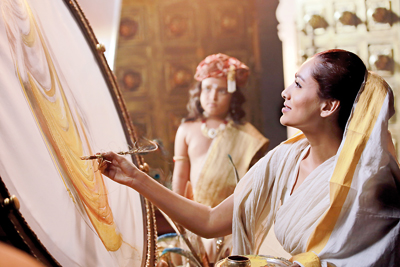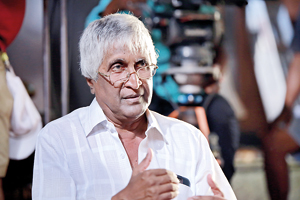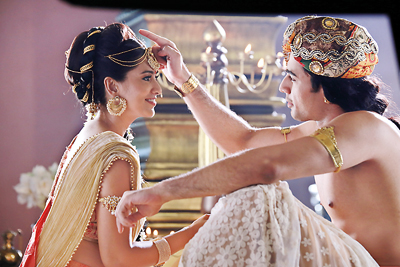The life of a forgotten Buddhist heroine unfolds

Cinematic moment: Yashodhara recites the naraseehagatha describing the virtues of Prince Siddhartha while painting a visual image on her mirror with her water colours and brushes
He is a noble Shakya prince
With a delicate and beautiful body
He renounced the worldly life
For the wellbeing of all living beings
That is indeed your father, who is a supreme human being…
He is of noble lineage, sprung from the warrior caste
His feet have been honoured by gods and men
His mind is well established in morality and meditation
That is indeed your father, who is a supreme human being….
Thus Yashodhara pays homage to her samsaric partner, when he returns to Kapilawasthupura as the Supreme Enlightened One. In exquisite poetic diction, Yashodhara recites Naraseehagatha to son Rahula, giving him a window to visualize his ‘absent father’ who renounced the banal domestic life for a bigger purpose towards humanity.

Prof. Ariyaratne
A ‘role model’ for women of all times, Yashodhara also referred to as Bimba, Bimbasundari, Manohara, Yashowathi, Gopa, Subhaddaka and Rahulamatha, is a motif for a ‘progressive woman.’
Poojawaliya, authored by Buddhaputhra Thera in the 13th Century, is credited as the oldest Sinhala literary source to turn the spotlight on Yashodhara. In the 17th century, the unknown folk poet of Yasodarawatha brought her close to the hearts of the ordinary people. Apart from the single chapter dedicated to Yashodhara in Poojawaliya and the slim volume of folk poetry, world literature has ‘forgotten’ her, points out scholar and film director, Prof. Sunil Ariyaratne, who through his new film Yashodhara unfolds the deep love she was capable of both as a life partner and a mother.
As the former Vice Chancellor of the University of Sri Jayewardenepura, Prof. Chandima Wijebandara notes, “Prof. Ariyaratne has seen in the love story of Siddhartha and Yashodhara, the twin functions of their rather uncommon yet ideal love. Bonding and liberating are the two functions their love has beautifully fulfilled.” He further says that the director has achieved a cinematic feat by depicting the “seemingly impossible philosophic balance of mundane and supramundane dimensions of love.”
How the literary canon could afford to be ‘ungrateful’ to a woman who was revered even by Lord Buddha is both baffling and disheartening says Prof. Ariyaratne. “In a mark of gratitude when Bhikkhuni Yashodhara predeceased Lord Buddha at the age of 78, Lord Buddha having performed her funeral rites on a magnificent scale, enshrined her relics and commissioned a stupa in Rajagahanuwara. The sacred stupa that came to be known as Yashodharamahaseya was paid homage to by countless devotees,” he explains. This stupa is sadly no more. He reiterates that Yashodhara who can be acclaimed as a ‘Theravada female Bodhisathva’ had been underpinned in all forms of art- be it literature, cinema or otherwise. “Characters of Patachara, Ambapali, Magandhi and Kundalakesi for instance have been more glorified than Yashodhara,” says Prof. Ariyaratne.

Newly weds:Prince Siddhartha and Yashodhara portrayed by A Chowdri and Pallavi Subhash
For the maker of Sarungale,Anupama, Kristhu Charithaya, Podi Malli, Siribo aiya, Sudusewaneli, Uppalawanna and Kusa Pabha fame, recreating this love story on the silver screen was chartering a trajectory like none other. Literary sources such as Yashodarawa authored by Ganegama Saranankara Thera in 1984, Lady of the Lotus written in 1974 by William Edmund Barret and cinematic creations such as ‘The Buddha’ and ‘Wife of Buddha’ did not offer sufficient inspiration for him for he found certain interpretations of the character controversial and contradictory to the Theravada tradition. With Poojawaliya as the primary source, Prof. Ariyaratne’s script, cinematically interprets the mutual understanding between Yashodhara and Siddhartha (played by Indian actress Pallavi Subhash and actor A. Chowdri respectively) cemented by their mutual compassion towards all living beings. When criticism is levelled at Yashodhara for her ‘failure’ to retain her husband in the worldly pleasures, she responds that his love for the world at large is more intense than his love towards her.
Having sacrificed her life partner, she makes a sacrifice equally hard or even harder- the giving up of her only child to the sasana. It is to Yashodhara that Siddhartha confides his disillusionment with the worldly existence, it is with her again that he confides he must leave behind a royal existence to find the answer to the end of samsaric suffering.
Their matrimonial bliss is juxtaposed with their journey of spiritual awakening, subtly achieved cinematically by the script writer, at times offering fresh interpretations and effortlessly blending into the plot and more crucially, without distorting the accepted tradition. When Siddhartha quietly steps into her chamber to get a parting glimpse of his beloved and their newborn, Yashodhara wraps a protective maternal arm around her infant in a gesture that may seem to be an unconscious one in her deep slumber, yet according to the film-maker it is a knowing movement by Yashodhara to prevent a possible bonding between the father and the newborn prince. This she does to aid him in his spiritual quest. Her recital of naraseehagatha in appreciation of the unmatched beauty and wisdom of her beloved while painting a visual image on her mirror with her water colours and brushes is yet another novel interpretation by the cinema-maker.
Yashodhara denounces royal comfort and embraces a frugal existence while still being mother to Prince Rahula within the royal palace of Kapilawasthupura. She convinces Rahula that his father will one day return as a superior human, while keeping his memories alive for him. A bo leaf which glides through her chamber windows, allegorically bears happy tidings that her soul mate had reached the supreme state of Buddhahood.
The film is produced by H.D. Premasiri, with music by Rohana Weerasinghe with Channa Deshapriya behind the camera and a cast of gifted artistes, including several newcomers.
Yashodhara is to be screened internationally shortly.


